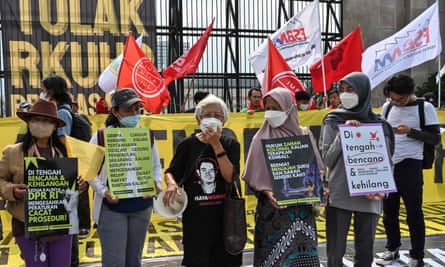[ad_1]
Indonesia’s parliament has approved legislation that outlaws sex outside marriage while making other sweeping changes to the criminal code – a move critics deemed a setback to freedoms in the world’s third-largest democracy.
The code, which will apply to Indonesians and visiting foreigners alike, will also prohibit cohabitation between unmarried couples. The changes also provides punishments for insulting the president.
Rights groups had protested against the amendments, denouncing a crackdown on civil liberties and a shift towards religious fundamentalism.
Yasonna Laoly, the minister of law and human rights, told parliament: “We have tried our best to accommodate the important issues and different opinions which were debated. However, it is time for us to make a historical decision on the penal code amendment and to leave the colonial criminal code we inherited behind.”
The code will not apply immediately but takes a maximum of three years to transition from the old code to the new one. The approval comes even as business groups warned it could harm Indonesia’s image as a tourism and investment destination.
Sex outside marriage will be punishable by a year in jail and cohabitation by six months, but charges must be based on police reports lodged by a spouse, parents or children.

Taufik Basari, a legislator of the NasDem Party, said if a tourist visiting Bali, for instance, had consensual sex with an Indonesian national, and it was reported to police by the Indonesian’s parent or child, the tourist could be arrested.
“I know it will impact tourism, which is why we should explain to the public that reports to police should be limited to what the family feels is really important,” he said. “As a parliamentarian, I will try to find more limitations for the implementation of these articles.”
Citra Referandum, the director of the Indonesian Legal Aid Institute, joined a small protest outside the parliament building in Jakarta on Tuesday. She said under the code “women can be punished” for their dress, adding that she expected “people’s anger will mount”.
“Indonesian democracy is dead,” she said. “This is reflected in a process that is not transparent or participatory and the anti-democratic substance of the criminal code.”
The code says the promotion of contraception and religious blasphemy are illegal. It also maintains abortion is a crime but it adds exceptions for women with life-threatening medical conditions and for rape, provided that the foetus is less than 12 weeks old, in line with what is already regulated in the 2004 Medical Practice Law.
It restores a ban on insulting a sitting president and vice-president, state institutions and national ideology. Insults to a sitting president must be reported by the president and can lead to up to three years in jail.
Sasmito Madrim, the chair of the Alliance of Independent Journalists (AJI) Indonesia, said the code curbed the “basic work” of reporting. He highlighted 17 “problematic articles” that criminalised “spreading communism”, defamation of the dead, and criticism of public leaders, among other areas.

“The new code has the potential to send journalists to prison,” he said.
Rights groups say the code underscores a growing shift towards fundamentalism in a country long hailed for its religious tolerance, with secularism enshrine in its constitution.
Andreas Harsono, a senior Indonesia researcher at Human Rights Watch, said the code could be selectively enforced because of its impracticality, citing “millions” of cohabiting unmarried couples in Indonesia.
He said the laws would “allow certain police officers to extort bribes”.
Protests have been much smaller than 2019 when a vote on a previous bill was delayed amid mounting public criticism that led to tens of thousands of people protesting nationwide.
“It’s exhausting and it has happened so fast,” said Harsono. “I thought the code might be changed again, like what we have seen over the last three years.”
[ad_2]




